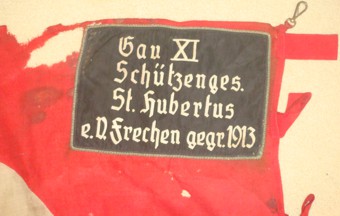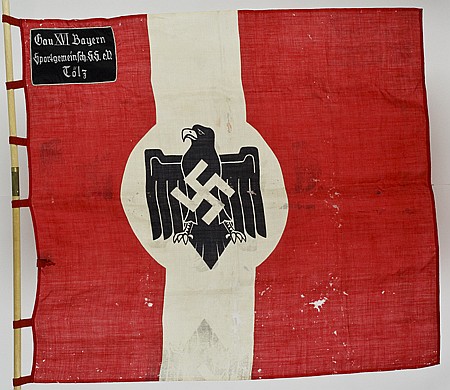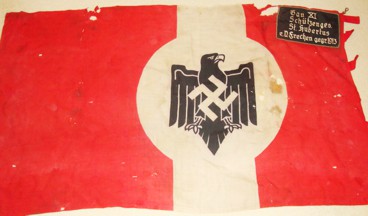![[German National League for Physical Education (NSDAP, Germany)]](../images/d/de_gl.gif) Image by Jaume Ollé
Image by Jaume Ollé
Last modified: 2025-01-11 by pete loeser
Keywords: nsdap | german national league for physical education |
Links: FOTW homepage |
search |
disclaimer and copyright |
write us |
mirrors
 patch example (reverse side)
patch example (reverse side)During the Third Reich there was a trend to transform all sports clubs and into National Socialist civil organizations, eventually placing them all under the control of the German National League for Physical Education - NSRL (Nationalsozialistischer Reichsbund für Leibesübungen). From the vexillological point of view this resulted in some very unimaginative, standardized, and uniform flags. The only difference between the usual National Socialist sports flag was the square patch in the canton identifying the which organization the flag was for.
Pete Loeser, 18 August 2012
In December of 1938, Adolf Hitler placed all German Sports activities under the Nationalsozialistischer Reichsbund für Leibesübungen (German National League for Physical Education) which became the sports organization that controlled all sports in the Third Reich. The NSRL director was called the Reichssportführer (the leader of German Sports) and he controlled all sports events in Germany, including the German National Olympic Committee. All other German sport associations gradually lost their freedom and were co-opted into the NSRL. The NSRL's leaders were Hans von Tschammer und Osten (1933–1943), Arno Breitmeyer (1943–1944) and Karl Ritter von Halt (1944–1945).
Pete Loeser, 18 January 2012
It should be mentioned that this depicted banner was a unique standard (copying a SA-standard) used on the occasion of the official presentation of the NSRL colours at Breslau in 1938. Hans von Tschammer und Osten, the head of Nationalsozialistischer Reichsbund für Leibesübungen (NSRL), received the new NSRL banner from Dr. Wilhelm Frick on the occasion.
Fornax, posted 18 January 2012
The Nationalsozialistischer Reichsbund für Leibesübungen was the umbrella organization for sports during the Third Reich. As the sports governing body seeking to control and integrate all sport activities in Germany, the NSRL provided a highly organized structure. Because of this, not surprisingly, many of the lower division flags were based on the pattern of the NSRL flag. Some more independent lower division sports organizations, however, like the DRV (Deutschen Radfahrer-Verband - German Bicycle Union), managed to escape the NS flag standardization.
 Image from artfact.com, 24 February 2011
Image from artfact.com, 24 February 2011
Editorial Comment: The black patch on this Schützenfahne (shooting club flag) seems to read: Gau XVI Bayern/Sportgemeinsch. S.S. e.V./Tölz. (district 16/registered sports community or association/Tölz?). The Schützenbund also had departments of sport shooting (guns, pistols, archery, etc.). Schützenvereine have long been a tradition in Germany and they predate the more modern athletics clubs. In the late Middle Ages, they seem to have played some role in the citizen's militia, and were sometimes active as something similar to a guild. Their main task probably was defence against bandits and plundering groups of enemy troops, and they were not actually a part of any regular military campaigns.
The German abbreviation "e.V." stands for eingetragener Verein, which means "registered association."
Ole Andersen, 14 June 2002
The Gau in the inscription is probably not a Nazi Gau, but the Schützengau, the district of a higher level shooting association.
It is common practice for many different kinds of associations and clubs (Vereine) here in Germany (especially shooting clubs, voluntary fire brigades; traditional custom clubs; veterans' clubs; sports clubs, etc.) to have flags, usually embroidered. Originally, they were something like the "regimental colours", and today there are probably tens of thousands of these different flags in clubs in Germany. A whole terra incognita for vexillology!
M. Schmöger, 14 June 2002
 (reverse side)
(reverse side)
Image from James Bohanek, 18 August 2012
After the German Cycling Federation (Bund Deutscher Radfahrer - BDR), which had been created in 1884 in Leipzig, was dissolved under the Third Reich in 1933 after Hitler seized power, it was replaced by the NS German Bicycle Union (Deutscher Radfahrer-Verband - DRV), and eventually becoming a unit (fachamt) of the German National League for Physical Education (Nationalsozialistischer Reichsbund für Leibesübungen).
The DRV itself was disbanded in 1945 for being the branch of a Nazi organization. It was reborn as part of the Deutscher Sportausschuss (the DDR's German athletic sports body) in East Germany in 1946, and re-established as the BDR in 1948 in West Germany.
Pete Loeser, 21 August 2012